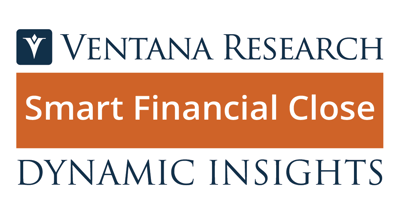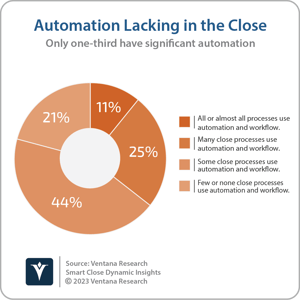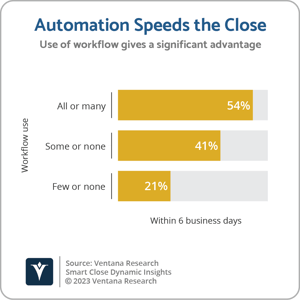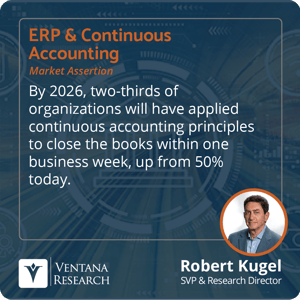We conducted our recent Smart Financial Close Dynamic Insights Research in part to assess to what extent the substantial disruptions of the pandemic have impacted the accounting close. When office lockdowns began in the first quarter of 2020, many finance departments were challenged to conduct the quarterly close remotely without face-to-face interactions. In the United States, the Securities and Exchange Commission was so concerned that corporations would be unable to meet filing deadlines that it gave registrants carte blanche to extend the filing if necessary. As it turned out, only a relative handful did, with all but one based in China. But for many, that first calendar close required a heroic effort.
Since then, organizations have made concerted efforts to adopt and use technology to enable operational resilience under any conditions. Our research finds that while  organizations have, adapted to operating in a remote working environment, progress toward a faster close has been elusive. The research also confirms that organizations using technology effectively to automate processes complete the close sooner.
organizations have, adapted to operating in a remote working environment, progress toward a faster close has been elusive. The research also confirms that organizations using technology effectively to automate processes complete the close sooner.
For the past two decades, Ventana Research has focused on the close process because it is a key measure of a finance and accounting department’s effectiveness. Almost all midsize and larger companies regularly complete an accounting close. There has been general agreement since at least the 1990s that organizations should be able to perform this task within one business week. Our research on the accounting close has consistently shown that companies with very similar characteristics (measured in terms of revenue, number of employees, location and industry) vary considerably in the number of days it takes to complete the accounting cycle. The lack of connection between the structural conditions of an organization and the time it takes to close the books suggests that the obstacles to a faster close are not innate but the result of poor process design and execution, insufficient automation of the process or choices made by finance executives. One of those choices is deciding — for whatever reason — not to close sooner.
Since 2020, there has been a great deal of discussion about the technology organizations use to digitally transform finance processes and overcome obstacles caused by the lack of in-person contact in work environments. Our research suggests that since departments have adapted to remote working conditions, this has not had any impact on shortening the close.
The key finding of the research indicates that although accounting departments rose to the challenge of disruptions, any digital transformation that occurred did not as yet result in improved timing of the monthly close. The research reveals that 59% of participants complete the monthly close within six business days compared to 60% recorded in our Office of Finance Benchmark Research in 2019, a statistically insignificant difference.
improved timing of the monthly close. The research reveals that 59% of participants complete the monthly close within six business days compared to 60% recorded in our Office of Finance Benchmark Research in 2019, a statistically insignificant difference.
At the same time, the research shows a smaller percentage of organizations can complete the quarterly close within six business days: 44% in 2023 versus 49% in 2019, although this statistic is in line with the previous finding in 2014. The quarterly close is more rigorous and requires a broader set of processes, and many departments that depend on manual processes likely found the close takes longer when people are not working face-to-face.
The reasons for wanting to close sooner have not changed. We asked participants to select from a list of four options the most important motivation to accelerate the process. Having more time for analysis and auditing before publishing financial statements was the most frequently selected (37%), followed by releasing financial information as soon as possible (33%) and communicating information to management as soon as possible (27%), while only 2% selected reducing the time and money spent on the process. The focus is squarely on effectiveness, not efficiency. These findings are consistent with past research.
Our research suggests the timeliness with which the (rest of the) organization receives information needs greater attention from finance executives. While 29% of participants said that all or almost all of the information the department provides to the entire organization is available when needed, two-thirds (67%) characterized it as somewhat timely, and 4% said it is not very timely.
that all or almost all of the information the department provides to the entire organization is available when needed, two-thirds (67%) characterized it as somewhat timely, and 4% said it is not very timely.
Financial statement accuracy is the ultimate objective of the department. For that reason, both the consistency and quality of the data used to prepare those statements are important. The research reveals that 12% of participants described these as significant issues in preparing financial reports, while 24% said they were somewhat significant. One-half (49%) noted that they did not have a significant effect, and 10% found they had none.
Our research has consistently found a connection between the degree to which automation is used in the close and the ability to complete the work sooner. For example, 50% of those automating most or all reconciliations (31% of the total) can close the quarter within six business days, compared to only 33% that apply little or no automation to the reconciliation process. Similarly, 54% of organizations using workflows in the process close the quarter within six business days, compared to 21% that employ a limited amount of automation. Such automation pays off in part because it reduces time lost by ensuring that steps are completed on schedule or hand-offs between steps are not delayed. Despite this positive impact, only 11% of organizations currently use workflows extensively.
Ventana Research advocates a management approach for the finance and accounting department that we call Continuous Accounting, which emphasizes the importance of fostering a continuous improvement culture to overcome inertia and set a pattern of implementing change that improves performance. One of the more important advances in IT is the ability to control the quality of data used in accounting by fully automating its movements between systems to ensure its fidelity without time-consuming checks and reconciliations. Using technology for this purpose is part of the doctrine of continuous accounting. We assert that by 2026, two-thirds of organizations will apply continuous accounting principles to close the books within one business week, up from one-half today.
fostering a continuous improvement culture to overcome inertia and set a pattern of implementing change that improves performance. One of the more important advances in IT is the ability to control the quality of data used in accounting by fully automating its movements between systems to ensure its fidelity without time-consuming checks and reconciliations. Using technology for this purpose is part of the doctrine of continuous accounting. We assert that by 2026, two-thirds of organizations will apply continuous accounting principles to close the books within one business week, up from one-half today.
Departments that have shortened the close often cite the ability to deal with all of the little things that delay the process as the main reason for success. In this vein, we asked participants if they have a process to address factors that may lengthen the close. Nearly one-half (44%) of participants cited a monthly or quarterly review session, which our research suggests is the most effective way to achieve a shorter close. Another 38% discuss and address major issues as they arise, which we have found to be a less effective approach. Only 18% do not do a review.
The latest Smart Financial Close Dynamic Insights Research results indicate that organizations have made little progress in the decades-long quest to close sooner. The findings confirm the value of a faster close to the organization, resulting in improved analysis and more timely information that enables executives and managers to make more informed decisions sooner.
The data also suggest that technology plays an important role in accelerating the process, as those that use close automation, workflows and software to automate reconciliations are much more likely to close sooner than those that do not. I recommend that financial executives – especially controllers – who are committed to enabling their finance organization to play a more strategic role in their company focus on ways to streamline the close process, especially when the close takes more than one business week. Specifically, they should consider how technology can help them achieve better results. I am optimistic that digitization efforts focused on resiliency will also support a faster close.
Regards,
Robert Kugel
 organizations have, adapted to operating in a remote working environment, progress toward a faster close has been elusive. The research also confirms that organizations using technology effectively to automate processes complete the close sooner.
organizations have, adapted to operating in a remote working environment, progress toward a faster close has been elusive. The research also confirms that organizations using technology effectively to automate processes complete the close sooner. improved timing of the monthly close. The research reveals that 59% of participants complete the monthly close within six business days compared to 60% recorded in our Office of Finance Benchmark Research in 2019, a statistically insignificant difference.
improved timing of the monthly close. The research reveals that 59% of participants complete the monthly close within six business days compared to 60% recorded in our Office of Finance Benchmark Research in 2019, a statistically insignificant difference.  that all or almost all of the information the department provides to the entire organization is available when needed, two-thirds (67%) characterized it as somewhat timely, and 4% said it is not very timely.
that all or almost all of the information the department provides to the entire organization is available when needed, two-thirds (67%) characterized it as somewhat timely, and 4% said it is not very timely. fostering a continuous improvement culture to overcome inertia and set a pattern of implementing change that improves performance. One of the more important advances in IT is the ability to control the quality of data used in accounting by fully automating its movements between systems to ensure its fidelity without time-consuming checks and reconciliations. Using technology for this purpose is part of the doctrine of continuous accounting. We assert that by 2026, two-thirds of organizations will apply continuous accounting principles to close the books within one business week, up from one-half today.
fostering a continuous improvement culture to overcome inertia and set a pattern of implementing change that improves performance. One of the more important advances in IT is the ability to control the quality of data used in accounting by fully automating its movements between systems to ensure its fidelity without time-consuming checks and reconciliations. Using technology for this purpose is part of the doctrine of continuous accounting. We assert that by 2026, two-thirds of organizations will apply continuous accounting principles to close the books within one business week, up from one-half today. 








